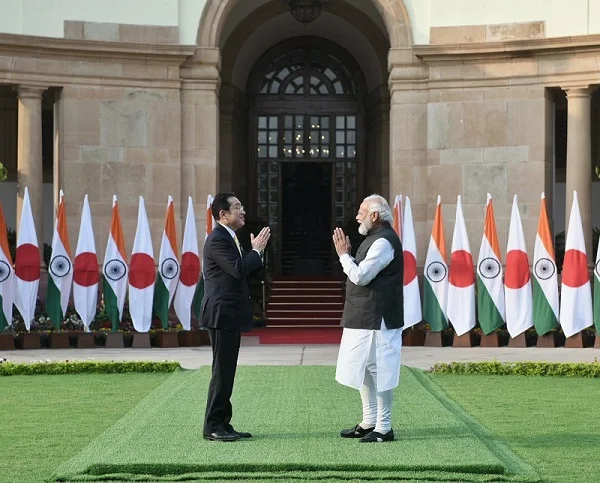

PM Narendra Modi with Japanese Prime Minister Fumio Kishida at the Hyderabad House in New Delhi on March 19, 2022 (File image courtesy: PIB)
Japanese Prime Minister Fumio Kishida will present Tokyo’s “new plan” for a Free and Open Indo-Pacific (FOIP) during his India visit, starting Monday.
Kishida and Prime Minister Narendra Modi will hold the annual India-Japan Summit meeting on March 20, discussing various important issues facing the international community as respective chairs of G7 and G20.
The Japanese PM is then scheduled to give a policy speech on ‘Free and Open Indo-Pacific’ where he will present a new plan for FOIP, which he said would be announced by this spring.
Both countries have repeatedly affirmed their common vision for a free and open Indo-Pacific, free from coercion and underpinned by inclusiveness and rules-based order.
That Kishida has chosen India to make the significant announcement spotlights the shared interests of the leading powers in the Indo-Pacific region and India’s immense geopolitical clout which Tokyo had realised long ago.
Threatened by Chinese belligerence, it was during his visit to New Delhi in August 2007 that Japan’s longest-serving Prime Minister, the late Shinzo Abe delivered his famous ‘The Confluence of Two Seas’ speech in the Indian Parliament and came up with the concept of the ‘Indo-Pacific’ for the first time.
It not only led to the elevation of the India-Japan relationship to the level of a Special Strategic and Global Partnership but also gave way to the formation of the Quad partnership between India, Japan, Australia and the United States.
With their commitment to promoting peace, security, and prosperity in the Indo-Pacific region, PM Modi and Kishida have affirmed the importance of bilateral and plurilateral partnerships among like-minded countries of the region, including quadrilateral cooperation.
The two leaders have also vowed to deepen security and defence cooperation between the two countries, which has already taken giant strides with the holding of the 2+2 meeting of their Foreign and Defence Ministers and a string of joint military exercises between the Indian Armed Forces and Japan Self-Defense Forces.
New collaborations in the area of defence equipment and technology, including renewed pace and fresh impetus to ongoing partnerships in the area of Unmanned Ground Vehicle (UGV) and Robotics, are also on the cards during Kishida’s visit.
With the current international security environment becoming complex and severe, Japan, under its new Security Policy, has committed to implementing strategic approaches, harnessing its comprehensive national power including economic, technological and strategic capabilities, as an integrated and efficient means.
As reported by IndiaNarrative.com earlier this week, Japan has lauded India’s efforts of utilising its ongoing G20 Presidency to give resonance to the voice of the ‘Global South’ at a time when the world continues to face a major crisis.
Tokyo has asserted that it attaches “great importance” to cooperation with India, especially when it comes to supporting India’s efforts to raise the concerns of the Global South.
Also Read: Challenged by China, will India and Japan join forces to bail out Global South during Kishida visit?
India's coal imports fell by 7.9 per cent, totalling 243.62 million tonnes (MT), compared to…
At least 88 illegal Bangladeshi migrants have been traced and detained by teams of South…
Japan has accused China of conducting maritime scientific research without prior notification within its exclusive…
Indian businesses are aiming exports to the tune of USD 1 trillion in the current…
Border Security Force (BSF's) Assistant Commandant Neha Bhandari commanded a forward post along the International…
The French Ambassador for the Ocean and French President's Special Envoy for the United Nations…